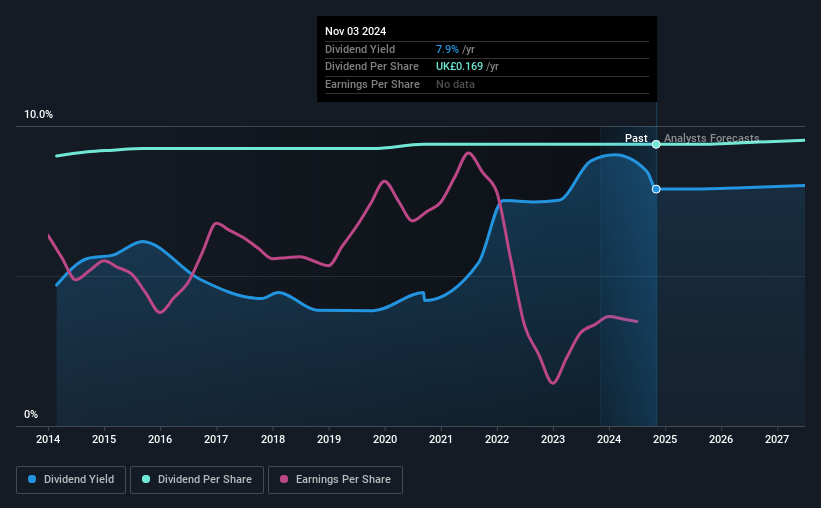- United Kingdom
- /
- Capital Markets
- /
- LSE:ASHM
Dividend Investors: Don't Be Too Quick To Buy Ashmore Group Plc (LON:ASHM) For Its Upcoming Dividend

Regular readers will know that we love our dividends at Simply Wall St, which is why it's exciting to see Ashmore Group Plc (LON:ASHM) is about to trade ex-dividend in the next three days. The ex-dividend date is one business day before a company's record date, which is the date on which the company determines which shareholders are entitled to receive a dividend. The ex-dividend date is important as the process of settlement involves two full business days. So if you miss that date, you would not show up on the company's books on the record date. This means that investors who purchase Ashmore Group's shares on or after the 7th of November will not receive the dividend, which will be paid on the 6th of December.
The company's next dividend payment will be UK£0.121 per share, and in the last 12 months, the company paid a total of UK£0.17 per share. Calculating the last year's worth of payments shows that Ashmore Group has a trailing yield of 7.9% on the current share price of UK£2.14. If you buy this business for its dividend, you should have an idea of whether Ashmore Group's dividend is reliable and sustainable. We need to see whether the dividend is covered by earnings and if it's growing.
Check out our latest analysis for Ashmore Group
Dividends are typically paid from company earnings. If a company pays more in dividends than it earned in profit, then the dividend could be unsustainable. Ashmore Group distributed an unsustainably high 121% of its profit as dividends to shareholders last year. Without more sustainable payment behaviour, the dividend looks precarious.
When the dividend payout ratio is high, as it is in this case, the dividend is usually at greater risk of being cut in the future.
Click here to see the company's payout ratio, plus analyst estimates of its future dividends.

Have Earnings And Dividends Been Growing?
When earnings decline, dividend companies become much harder to analyse and own safely. If business enters a downturn and the dividend is cut, the company could see its value fall precipitously. With that in mind, we're discomforted by Ashmore Group's 12% per annum decline in earnings in the past five years. Such a sharp decline casts doubt on the future sustainability of the dividend.
Another key way to measure a company's dividend prospects is by measuring its historical rate of dividend growth. Ashmore Group's dividend payments are broadly unchanged compared to where they were 10 years ago. If a company's dividend stays flat while earnings are in decline, this is typically a sign that it is paying out a larger percentage of its earnings. This can become unsustainable if earnings fall far enough.
To Sum It Up
Has Ashmore Group got what it takes to maintain its dividend payments? Earnings per share are in decline and Ashmore Group is paying out what we feel is an uncomfortably high percentage of its profit as dividends. It's not that we hate the business, but we feel that these characeristics are not desirable for investors seeking a reliable dividend stock to own for the long term. This is not an overtly appealing combination of characteristics, and we're just not that interested in this company's dividend.
So if you're still interested in Ashmore Group despite it's poor dividend qualities, you should be well informed on some of the risks facing this stock. For example - Ashmore Group has 2 warning signs we think you should be aware of.
A common investing mistake is buying the first interesting stock you see. Here you can find a full list of high-yield dividend stocks.
New: Manage All Your Stock Portfolios in One Place
We've created the ultimate portfolio companion for stock investors, and it's free.
• Connect an unlimited number of Portfolios and see your total in one currency
• Be alerted to new Warning Signs or Risks via email or mobile
• Track the Fair Value of your stocks
Have feedback on this article? Concerned about the content? Get in touch with us directly. Alternatively, email editorial-team (at) simplywallst.com.
This article by Simply Wall St is general in nature. We provide commentary based on historical data and analyst forecasts only using an unbiased methodology and our articles are not intended to be financial advice. It does not constitute a recommendation to buy or sell any stock, and does not take account of your objectives, or your financial situation. We aim to bring you long-term focused analysis driven by fundamental data. Note that our analysis may not factor in the latest price-sensitive company announcements or qualitative material. Simply Wall St has no position in any stocks mentioned.
About LSE:ASHM
Flawless balance sheet with proven track record and pays a dividend.
Similar Companies
Market Insights
Community Narratives


